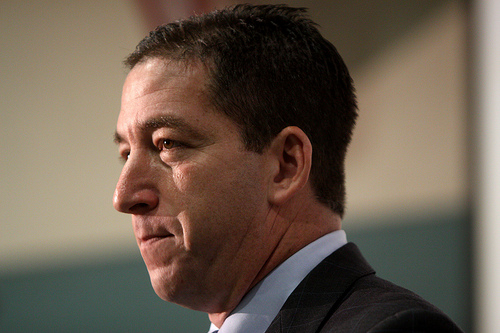TRANSCRIPT
AMY GOODMAN: Let’s talk about The Intercept. Glenn, talk about the launching of this new website today, together with Jeremy and Laura, what you’re doing with The Intercept, what your plans are.
GLENN GREENWALD: Sure. So, you know, it was only, I think, four months ago or so that we first had conversations with Pierrre Omidyar, who is the publisher of the site through First Look Media, about working together. Jeremy, Laura and I were off in one corner planning our own media site, and he was off in another planning his, and we realized that we could work together effectively. And we ended up getting launched in a very short period of time, relatively speaking, when you’re talking about launching a new media outlet, in part because we feel a serious obligation to get up and running so that we can report on the stories like the one that we reported on today and all of the rest of the stories that come out of the archive of documents that our source Edward Snowden provided to us, as well as other sources that we’re now developing. And so, we intended to start with a fairly limited function, although one that’s profoundly important, which is to give us a place where we can aggressively report on these NSA documents. There are many, many, many more big stories left to report. And we’re thrilled that we get to work with each other and an amazing team of journalists that we recruited. And then we’re going to start slowly and inexorably expanding the range of topics that we cover. We’re really about a journalistic ethos, which is not doing things like helping the United states government continue its targeting of U.S. citizens for death, like AP just did by withholding information allowing it to continue, but by being adversarial to the government and telling the public what it ought to know, and targeting the most powerful corporate and political factions with accountability journalism. And we’re thrilled that we get to work together, that we have a new media outlet that is devoted to these principles, that we have the resources to protect our sources and enable the journalists that work with us to do the kind of journalism that we think is so sorely lacking.
JEREMY SCAHILL: Amy, can I add to that?
AMY GOODMAN: Yes, Jeremy.
JEREMY SCAHILL: Right. You know, what we’ve seen also in—over the past month is a very serious escalation in the threats coming from the Obama administration and coming from Capitol Hill against journalists. There is this attempt on the part of the Director of National Intelligence James Clapper to imply that the journalists who are reporting on the Snowden documents are accomplices to a crime. My understanding, from a confidential source in the intelligence community, is that Clapper, two weeks before he publicly used that term of accomplice, that he also said that in a top-secret classified briefing within the intelligence community, sort of floating it. You know, Mike Rogers also has just been on a rampage against journalists, also against Snowden, making totally unfounded allegations about Snowden being somehow a Russian agent or cooperating with Russian agents. And so, the timing of this site and why we felt it was so urgent to start reporting on these stories right now is to push back against this climate of fear and to say that we, as independent journalists, are not going to back down in the face of government threats, that in fact this is when it is most important to stand up for a truly free and independent press, is when those in power start to try to, you know, push their fists down upon you. AMY GOODMAN: Well, Jeremy, I want to play a recent exchange between House Intelligence Committee Chair Mike Rogers and FBI Director James Comey. This is Congressman Rogers.
REP. MIKE ROGERS: There have been discussions about selling of access to this material to both newspaper outlets and other places. Mr. Comey, to the best of your knowledge, is fencing stolen material—is that a crime?










